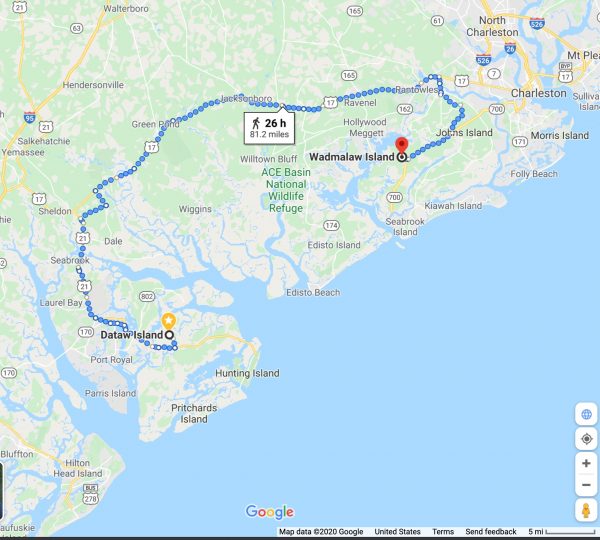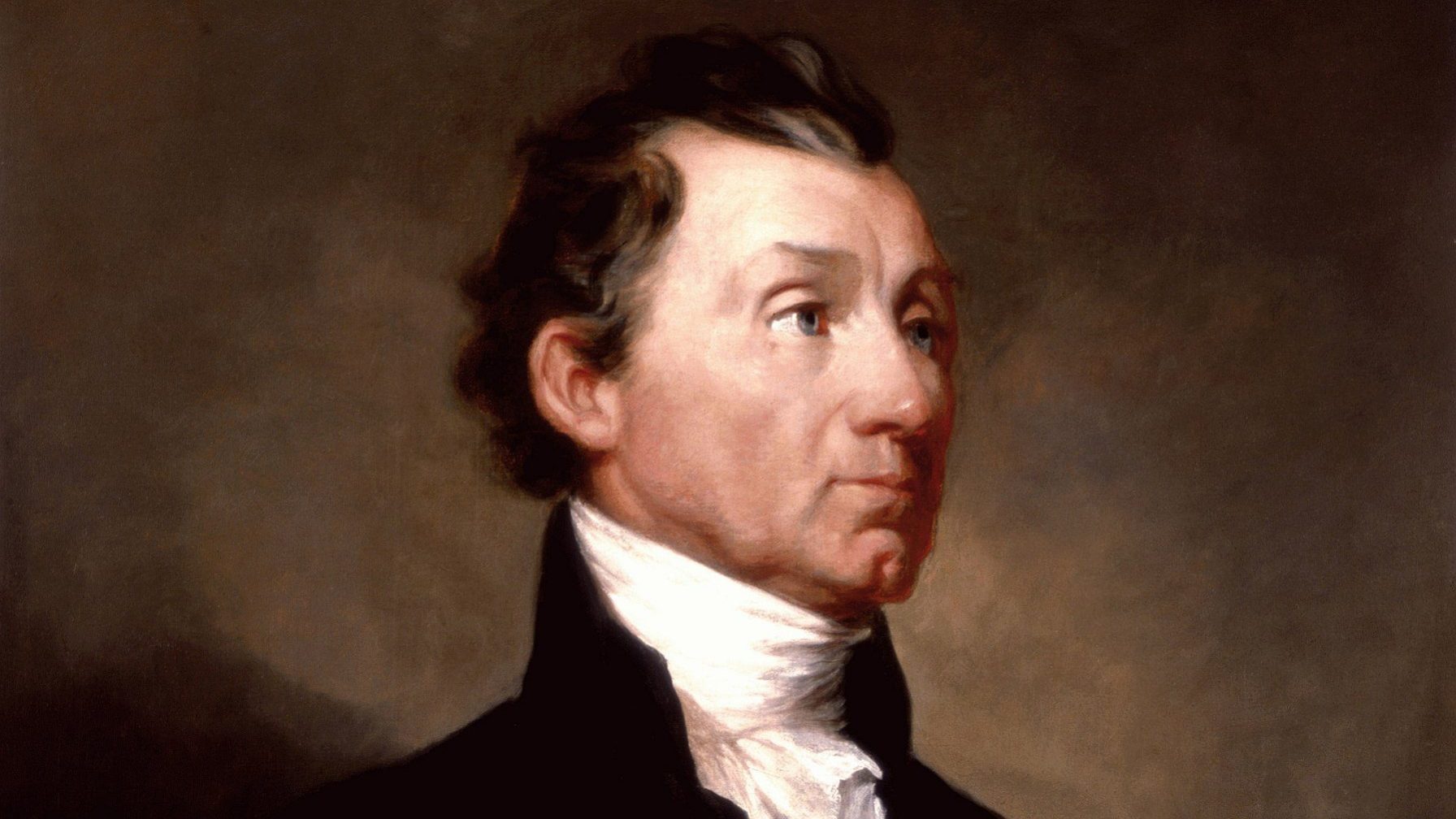James Monroe (April 28, 1758 – July 4, 1831) was an American statesman, lawyer, diplomat, and Founding Father who served as the fifth president of the United States from 1817 to 1825.
The theme this week is MIDDLE. I am at week 26 and half-way through 2020. This gave me an idea for a new historical perspective on the Sams. Just imagine, when Lewis Reeve and Sarah Sams‘ children Lewis Reeve Sams, Jr. and his brother Miles Brewton Sams were in their teens – so were Abraham Lincoln, Ralph Waldo Emerson, and Harriet Beecher Stowe. What they have in common is 1822. The Sams era on Datha Island started in 1783 and ended abruptly in 1861. The middle of that period was 1822.
1822
- Napoleon had recently died while imprisoned on Saint Helena Island in the Atlantic Ocean.
- Thomas Jefferson and Beethoven were still alive.
- Stanhope Augustus Sams, Marion Washington Sams, Donald Decatur Sams, and Evelina Edings Sams were infants – and so were Florence Nightingale, Susan B. Anthony, and Harriet Tubman.
This article is about 1822 and the Sams. To give you a sense of that year, I’ll describe some key people and events – both at the national level, in Beaufort, and on Datha Island.
James Monroe was President (served 1817 – 1825). He was our last president from the line of Virginia politicians before him. “He also served as the governor of Virginia, a member of the United States Senate, the U.S. ambassador to France and Britain, the seventh Secretary of State, and the eighth Secretary of War.” [Wikipedia] He is best known for the Monroe Doctrine. The doctrine asserted that the New World and the Old World were to remain distinctly separate spheres of influence. The separation intended to avoid situations that could make the New World a battleground for the Old World powers so that the U.S. could exert its influence undisturbed. After holding for decades, Monroe’s declaration is recognized as a defining moment in the foreign policy of the United States.[Wikipedia] In 1819, Beaufort was honored to host President Monroe.
The year 1819 may be marked as the watershed year for the Beaufort community. The pinnacle of pride and honor of the distinguished old sea island town was the visit of President James Monroe on May 6 to May 8 of that year.
Lawrence S. Rowland
Thomas Bennett Jr. was the Governor of South Carolina (served 1820-1822) and a respected businessman, banker, and politician. It was under his watch that the Denmark Vesey rebellion and trial took place. Vesey was a literate, skilled carpenter, and free African American. In June 1822, he was accused and convicted of being the leader of “the rising,” a potentially major slave revolt that was scheduled to take place in the city in July. Vesey and a group of conspirators were tried, convicted, and executed. This potential slave uprising reverberated through the South for decades. Plantation owners feared another uprising and used the Vesey incident as justification for the continued suppression of the enslaved, even in Beaufort. Governor Bennett lost some support due to his attempts to calm what he viewed as exaggerated claims about the size and likelihood of possible uprisings.
The Sams era on Datha Island was half over by 1822, though, of course, no one knew this. William and Elizabeth Sams and three of their four sons were gone. The four remaining sons were in their prime, and their families were growing. So much would change between 1823 and 1861, a period about as long as our Dataw Island community has been here.


Datha Island Sams
Once the Sams arrived on Datha in 1783, William and Elizabeth had three more sons. Of the Wadmalaw generation of Sams, only Francis Sams, his sister-in-law Catherine Deveaux Sams, and her three children by John are still alive in 1822. (Maybe; we don’t know what happened to the two daughters.) Of the Datha born Sams, in 1822, Lewis Reeve Sams was 38, Berners Barnwell Sams was 35, and Edward Hext Sams was 32. You’ve heard many times that Lewis Reeve and BB had large families. But at that time, they had no idea how many wives or children they would eventually have.
In 1822, Lewis Reeve [age 38] & Sarah Fripp [age 33] have five children and have lost two children. Sarah would pass away in three years. In 1835 L. Reeve remarries and has four more children.
But in 1822 the family consisted of:
- Lewis Reeve Jr [12]
- Miles Brewton [11]
- Angerona Hext – Died in 1818 at the age of 5.
- Caroline Edings [7]
- Robert Barnwell – Died in 1817 at the age of three months.
- Stanhope Augustus [2]
- Marion Washington [1]
In 1822, Berners Barnwell Sams [35] & Elizabeth Fripp [27] have four children and have lost two. They would have five more children before Elizabeth passes away during the birth of Elizabeth Exima Sams in 1831. He quickly remarries and has four more children by wife, Martha Fripp Edwards.
But in 1822 the family consisted of:
- Berners Bainbridge [8]
- Melvin Melius [7]
- William Washington – Died at age three months in 1817
- Ariana Adeline – died at age nine months in 1819.
- Donald Decatur [2]
- Evelina Edings [1]
In 1822, Edward Hext Sams [32] & Sarah Fripp [28] also have four children. They were married in Beaufort in 1814 and left the area quickly. Their first child is born near Darien, Georgia, their second on Datha in 1815. I don’t know where their third and fourth children are born. The family spent most of their lives in Florida, but I have been unable to find any of their graves. Their children in 1822 are:
- Francis William [7]
- Elizabeth Emily [5]
- Angeline Hext [3]
- Edward Hext Jr [2]
From an 1822 perspective, the Wadmalaw-born Sams are either gone or have moved back to the Charleston area. Edward & Sarah Sams are somewhere in Florida. In Beaufort, we have Lewis and BB with modest size families. The rise of Sea Island Cotton is nearly complete as all available land is bought up. The Sams’ wealth grows for the next two generations [Week 8] [Rowland]. None of the boys are old enough to attend college yet; many eventually will. And no one believed political disagreements would lead to a bloody civil war, though the embers were burning.
The document below presents some of this Sams family history in a more graphical way. It shows the four married sons and their families’ birth, marriage, death dates – along with the head of household’s age at each event. The red lines mark 1822.
Sams Sons Ages
Sources
Holden, Joel and Riski, Bill – The Sams Family Tree, Ancestry.com, accessed June 27, 2020.
Rowland, Lawrence S., Moore, Alexander, Rogers Jr., George C. – The History of Beaufort County, South Carolina, Volume I, 1514 – 1861, Chapters 15 & 18, 1996
Wikipedia – accessed June 27, 2020
#52Sams Week 26 – Middle of an Era


